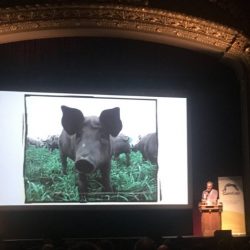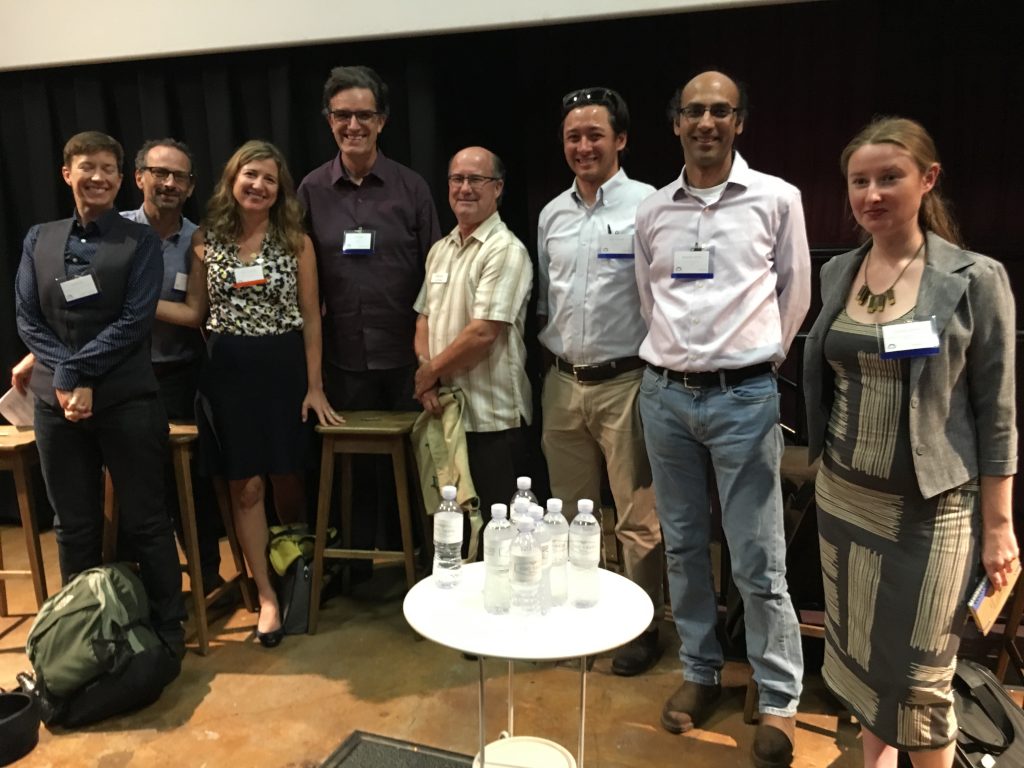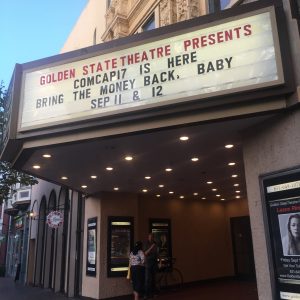 September 12, 2017 – Speakers at an inspiring social investing conference sponsored by Edible Monterey Bay this week are exploring how we all can have a positive impact on our local food system when we invest with our communities in mind—and how local food businesses can tap into new channels for this community support.
September 12, 2017 – Speakers at an inspiring social investing conference sponsored by Edible Monterey Bay this week are exploring how we all can have a positive impact on our local food system when we invest with our communities in mind—and how local food businesses can tap into new channels for this community support.
Many of the comments made about food producers and purveyors at ComCap17, held in various venues in downtown Monterey, were made during a panel Monday that focused on ways to finance local farms and fisheries.
“There is a need for an ecosystem of support,” said Brett Melone, director of lending for California FarmLink, which assists farmers in buying and selling land. “We need investors that are willing to take risks that others haven’t been willing to take, based on shared values,” he said.
As an example of what can happen when a community decides to support its own, Alan Lovewell, founder of Real Good Fish, the Moss Landing-based local fresh fish subscription service, described how he and his then co-founder Oren Frey essentially crowd-funded the company’s launch.
“I was solving my own problem,” Lovewell said, referring to his initial desire to simply find a way to connect with and buy fish directly from local fishermen in Monterey—much as he had growing up on Nantucket.

Ultimately, Lovewell recognized that there was a much larger disconnect between struggling local fishermen and the broader Monterey community in general. He founded Real Good Fish (initially called Local Catch Monterey Bay) to help connect local fishermen as directly as possible with consumers who were interested obtaining fresh, sustainable fish—and knowing where it came from.
“Our mission is really to support local fishermen, to build a bridge between what we’re experiencing on the oceans to our plates,” Lovewell said. “It has everything to do with the health of our fishermen.”
At first, Lovewell says that local fishermen were skeptical of his proposal—a community supported fishery, much like the more common community supported agriculture (CSA) model—through which members would purchase and receive weekly deliveries of fresh-off-the-boat fish.
But by using Google forms to put out an electronic survey to the public, Lovewell found about 400 local consumers who said they were interested in participating—two to four times the interest he was expecting—and local fishermen signed on.
The venture launched in January 2012 after 150 members signed up for an initial delivery of Dungeness crab through the website Farmigo. Today, Real Good Fish has 1500 members and pickup locations ranging from Carmel Valley to Marin County and the East Bay. Real Good Fish also brings fishermen into school classrooms and, through its Bay to Tray program, provides fresh and health healthful bycatch and an educational message about these less popular species for school lunch tacos and ceviche.
A desire to help local fishermen and the local fishery spawned another Monterey Bay success story described at ComCap17: the Monterey Bay Fisheries Trust.
Fishing is so engrained in Monterey history and culture that “you might not realize that local fishermen are struggling to survive,” said Sherry Flumerfelt, executive director of the trust.
But struggling they are, and using the story of local fisherman Joe Pennisi, she described how overfishing caused the Monterey Bay groundfish trawl fishery—comprised of 90 species, including local staples like sablefish, rockfish, petrale sole and lingcod—to collapse and be declared a failure by the federal government in 2000.
Seeking to better manage the fishery, the government in 2011 introduced a “catch share” program through which fishermen were allocated a certain percentage of the overall allowable annual catch. The idea was that once they reached their quotas, the fishermen would have to stop fishing or lease someone else’s share.
“The really good news is that many species have recovered years ahead of time,” Flumerfelt said. But the bad news, she added, is that many fishermen are still struggling, and moreover, they have had to compete with big out-of-state commercial fishing interests, causing the cost of quotas to go up and all but a few local fishing quotas to be leased or sold off to the outside enterprises.
Recognizing that the community would lose all its quotas for its own fish—and the accompanying economic and cultural benefits—if they did not act, a group of local community members set up the Monterey Bay Fisheries Trust in 2014. The trust buys up quotas and holds them in trust, leasing them out to local fishermen.
Unlike Real Good Fish, the trust’s purchases have not been funded through the investments of individuals, but through community-minded organizations like the Nature Conservancy, the Calvert Foundation, the California Fisheries Fund and the City of Monterey itself. But Flumerfelt said crowd funding might be something the organization would consider for the future.
To help keep local fish landings local, the trust’s next project is launching a Fish Hub for the Monterey Bay—something that will be a topic of conversation at the ComCap17 conference on September 13 at 1pm.
 Back to crowd funding and other models that can help Monterey Bay food producers turn broad-based community love into financing—and through which local Monterey Bay residents can help finance their beloved food businesses—panelist Arno Hesse offered his San Francisco-based Credibles.
Back to crowd funding and other models that can help Monterey Bay food producers turn broad-based community love into financing—and through which local Monterey Bay residents can help finance their beloved food businesses—panelist Arno Hesse offered his San Francisco-based Credibles.
Very simple in concept, Credibles provides a platform where food producers that need some upfront financing can offer customers a chance to log on and make upfront payments towards future deliveries of food and in return, receive varying percentages of extra product.
For instance, Watsonville-based Farmhouse Culture is now offering its products on the site through three levels of support: for $100, customers can become “friends” and receive $110 worth of product, or 10% extra krauts, kimchis and juices; for $250 they can become “fans” and receive $285.50 worth of product, or 15% extra; for $500, they can become “patrons” and receive $600 worth of goods, or 20% extra.
Purveyors receive payments as soon as buyers make them; buyers redeem their credit for their edibles with an app on their phones. (To redeem credit with Farmhouse Culture, for example, supporters can use the Credibles app at Whole Foods or one of the farmers’ markets where the ferments are sold.)
“Community underwriting works,” Hesse said. “No loan officers and no fund managers. It’s the community who gives you the money up front.”
About the author
SARAH WOOD—founding editor and publisher of Edible Monterey Bay—has had a life-long passion for food, cooking, people and our planet.
She planted her first organic garden and cared for her first chicken when she was in elementary school in a farming region of Upstate New York.
Wood spent the early part of her career based in Ottawa, Canada, working in international development and international education. After considering culinary school, she opted to pursue her loves for writing, learning about the world and helping make it a better place by obtaining a fellowship and an MA in Journalism from New York University.
While working for a daily newspaper in New Jersey, she wrote stories that helped farmers fend off development and won a state-wide public service award from the New Jersey Press Association for an investigative series of articles about a slumlord who had hoodwinked ratings agencies and investment banks into propping him up with some early commercial mortgage securitizations. The series led Wood to spend several years in financial journalism, most recently, as editor-in-chief of the leading magazine covering the U.S. hedge-fund industry.
Wood now lives with her family in Washington, DC, where she is a freelance writer and manages communications for Samaritan Ministry, an antipoverty and antiracist nonprofit that provides struggling Greater Washington residents with highly personalized and compassionate life counseling and coaching.
- Sarah Woodhttps://www.ediblemontereybay.com/author/swood/
- Sarah Woodhttps://www.ediblemontereybay.com/author/swood/
- Sarah Woodhttps://www.ediblemontereybay.com/author/swood/
- Sarah Woodhttps://www.ediblemontereybay.com/author/swood/



